Keywords Powerful book
Are you a new healthcare graduate in India, fresh from the rigorous journey of obtaining your MBBS, BDS, or another medical degree? If so, you’re likely no stranger to the immense challenges and pressures that come with the territory.
In a scenario characterised by fierce competition, mental hurdles, and moments of hopelessness, the initial years can be particularly trying. For many, the path to becoming a healthcare professional is marked by not only academic rigour but also financial constraints and a lack of strong support systems. This collective burden can take a significant toll on the mental and emotional well-being of new graduates.
In recognition of these challenges, this blog aims to provide guidance and inspiration to budding healthcare professionals.
I understand that what you need is not just philosophical or motivational push but tangible strategies and stories of resilience.
I have curated a list of five powerful books that offer valuable lessons, not only for surviving but thriving in the demanding field of healthcare.
These books touch on various aspects of personal and professional development, drawing from diverse fields like philosophy, productivity, leadership, and healthcare itself.
Let’s dive into a brief summary of each of these books and explore how their insights can help you on your journey as a new medical graduate. Additionally, I will suggest a few more books that might prove beneficial in your quest for success and well-being in the medical world.
1. ‘The Obstacle Is the Way’ by Ryan Holiday
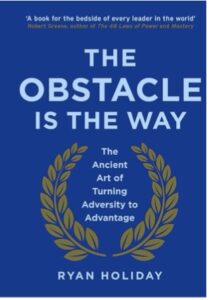
This book draws from Stoic philosophy, teaching the power of viewing obstacles as opportunities for growth and learning. It is divided in three parts:
- Perception
- Action
- Will
The book suggests that instead of avoiding obstacles, we should embrace them and use them as a path to personal and professional success. It’s a practical guide for applying Stoic principles to modern life.
How It Helps: For healthcare professionals, it fosters resilience and adaptability, crucial traits when facing challenging patient cases, demanding work hours, and the ever-evolving healthcare landscape.
2. ‘Deep Work’ by Cal Newport
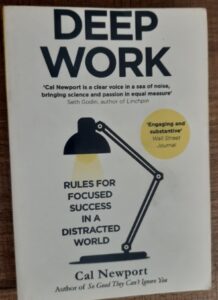
Newport argues that deep work is becoming increasingly rare and valuable in our information-driven economy. It’s the type of work that leads to innovation, high-quality output, and career success. The author explores strategies for achieving deep concentration and productivity in your work. The main idea of the book is to emphasise the importance of deep work in today’s distracted world and provide strategies for cultivating this skill.
The book addresses the negative impact of constant connectivity and the use of social media on our ability to concentrate. It encourages you to take control of your digital life and use technology intentionally and much more like work life balance,increasing efficiency and method for skill development.
How It Helps: In the fast-paced world of medicine, this book can help readers maintain focus during long shifts, make better use of study time, and manage a heavy workload efficiently.
3. ‘The Go-Giver’ by Bob Burg and John David Mann
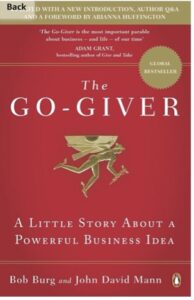
‘The Go-Giver’ encourages a shift in mindset from a focus on getting to a focus on giving. It emphasises that success is not solely about financial gain but also about making a positive impact on the lives of others. It urges readers to adopt a more generous and service-oriented approach to life and profession.
How It Helps: In medicine, building strong patient-doctor relationships and collaborating effectively with colleagues are vital. This book encourages the right mindset for compassionate care and teamwork.
4. ‘Extreme Ownership’ by Jocko Willink and Leif Babin
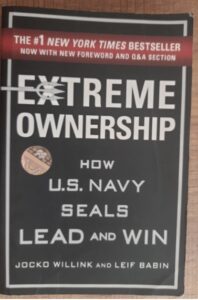
Written by former Navy SEALs, this book ‘Extreme Ownership’ is a guide for personal and professional development, with a strong focus on leadership and accountability. It encourages individuals to adopt a mindset of extreme ownership in all aspects of life, recognizing that taking responsibility for one’s actions and outcomes is a fundamental aspect of effective leadership and personal growth.
How It Helps: Medical professionals can apply these principles to lead healthcare teams, make critical decisions, and take responsibility for patient outcomes, enhancing their leadership skills in high-pressure situations.
5. ‘The Checklist Manifesto’ by Atul Gawande
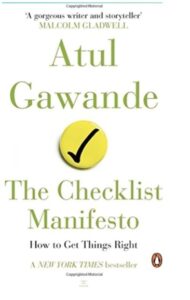
A well researched book on precision. Gawande explores how high demanding professions function efficiently where stakes are high and provides some real life examples and true stories for reference. For example, in a freak incident in Austria, an emergency checklist saved a drowning victim who had spent half an hour underwater or in Michigan where a cleanliness checklist in intensive care units virtually eliminated a type of deadly hospital infection.
How It Helps: In the medical field, the application of checklists, as advocated in ‘The Checklist Manifesto’ can lead to improved patient outcomes, reduced medical errors, and enhanced overall efficiency. It’s a practical approach that can help practitioners provide the best possible care while minimising risks.
These books collectively offer insights and strategies that can empower medical professionals to thrive in their demanding careers, navigate challenging patient scenarios, and find fulfilment in providing exceptional healthcare.
Further Reading
Additionally, consider exploring books like:
- ‘When Breath Becomes Air’ by Dr Paul Kalanithi for reflections on the medical journey. It is a memoir about his life, battling stage IV metastatic lung cancer was published posthumously.
- ‘Atomic Habits’ by James Clear for developing productive routines—all of which can contribute to success and well-being in the field of medicine.





















Comments